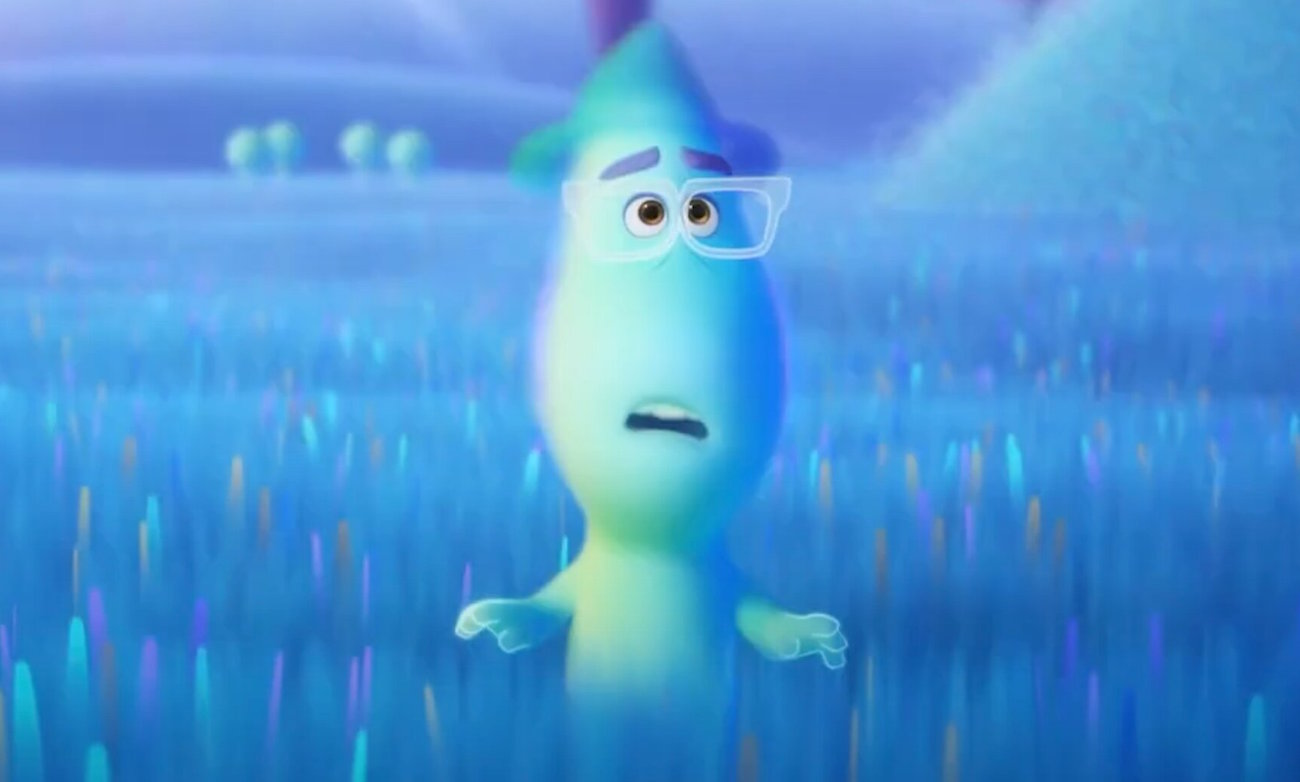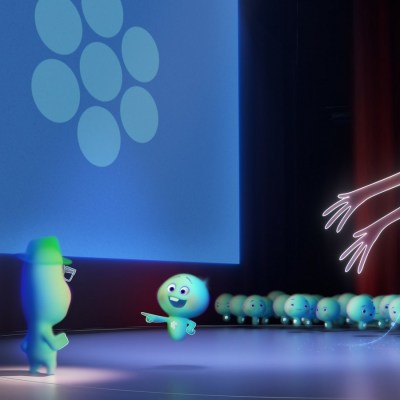This article contains Soul spoilers. You can find our spoiler-free review here.
What are you going to do with your life? It’s a looming question, and one that a few days ago Jamie Foxx’s Joe Gardner thought he knew the answer to. He was going to play jazz, professionally, and break into the music industry—specifically as the pianist for Dorothea Williams’ jazz quartet. But standing there on the ramp toward the Great Beyond, and staring at his second chance back on Earth, he’s posed the question again by a well-meaning Jerry.
So just what are you going to do with the rest of your life? For the first time, perhaps since he was a child, Joe didn’t have a firm answer. He simply says, “I don’t know but I’m going to live every moment of it.” And with that we see Joe, resurrected from the dead, step out of his home and actually look at the world around him. So what does he do next?
To answer that, it’s worth considering the journey he’s just been on throughout Pixar’s Soul and why it ended the way it did.
After Joe fell down a manhole in Lower Manhattan, he was catapulted into a cosmic adventure that took his soul from the end of the line to back where it all began in the Great Before. It was in the latter location that he bought himself at least a little more time by becoming a mentor to 22 (Tina Fey), an unruly soul who refused to embrace the concept of life. On paper, he simply taught her life is worth experiencing by putting 22 inside of his own body, where she discovered flowers smell wonderful, the sun is warm, and pizza really is delicious.
However, that’s the surface level version of events, and one writer-directors Pete Docter and Kemp Powers are refreshingly uninterested in settling for. While Soul savors the hijinks of putting Joe in the body of a cat, and 22 accidentally learning to talk smack at Joe’s neighborhood barbershop, those experiences are not why 22 decides to experience life. At least not entirely.
Joe thinks they are when he admonishes 22, saying she never found her purpose, and the only spark of life she felt was his. But it’s a fallacy to think his “spark,” a sense of inspiration felt by playing music and jazz, was his purpose or reason to live. While the inspiration is what makes Joe’s life worth living, it is not the whole of what his existence should be about—which might explain his greater frustration with his life, his mother, and his job as a part-time (soon to be full-time?) elementary school teacher.
One of the Jerrys helpfully spells this out for both Joe and the audience: a spark is not a purpose. It’s a naïve rabbit hole many a soul falls down to think they exist for one reason. And indeed, by reinforcing this narrow view of the world onto 22, Joe fails her; and he brings her lower than she’d ever been with her other mentors.
Joe realizes this after he finally gets to play with Dorothea Williams. The rest of his life appears to have arrived; he’s played jazz with his idol and she recognizes his talent. He might’ve just broken into the very narrow (and shrinking) world of professional jazz. Yet it doesn’t feel like a victory because there is very little in his life to celebrate it with. He might reach “the Zone” when he takes the Blue Note stage, but he can’t live there. If he tried he might become a zombie like other soulless automatons who wind up there, like the Wall Street hedge fund manager we saw earlier in the film.
He does return to the Zone though…. by joining Moonwind (Graham Norton) on a magical hippie pirate ship ride to the Zen place between the physical and metaphysical realms. Yet he does this simply to find 22 and learn the hard lesson he taught her.
By insisting that life is about one thing, one purpose, and that 22 can’t find her own, he offered her exceedingly negative reinforcement. This is not to say that Joe intentionally harmed her; he’d grown to like 22 as a teacher might celebrate a prized pupil. But as with many teachers and parents before him, Joe is forced to become aware of the dangers of negative reinforcement, and essentially demeaning a young mind’s spirit and unintentionally pushing them toward apathy, or worse, resignation.
And 22 is certainly resigned by the climax, giving into the cynicism of every harsh word she’s heard over the centuries and millennia from mentors. When Joe enters the dark void she’s created, like the other zombies who lost their souls to their obsessions, he sees all the cruel things 22’s other mentors have said to her, but none is quite so monstrous as her vision of Joe: an enormous figure she imagines is screaming down at her, insisting she has no reason to live or exist.
By seeing his own mania through the eyes of another soul, Joe sees his failures clearly, both toward 22 and himself. It is only then he is able to break through to 22 and give her the inspiration she needs to embrace life… and in the process he saves his own.
This occurs literally at first, with the Jerrys so impressed with how Joe’s mentored 22 that they allow him to continue on this mortal coil without fear of the calculating Terry. However, it also means he’s saved himself from becoming obsessed and robbed of his inspiration, even if it is with a career on the stage.
Read more
So what does Joe do next with his life? Well, to be honest it is left entirely up to the viewer. As a personal bit of speculation, I wonder if there was a rewrite or internal debate at Pixar about this, because many of the story elements of Soul seem to point to Joe realizing his life is fuller as a teacher than as just a pianist. In a brief early sequence, we see him at the elementary school, and he looks more enthusiastic talking about jazz and explaining why students should celebrate “getting in the zone” than he did on the night he played with Dorothea.
And at the barbershop, he discovered his barber once dreamed of being a veterinarian but then life got in the way, and he wound up as a barber—yet Joe’s buddy remains happy with his ability to “save lives,” just as he saved Joe’s hairstyle. I personally wonder if an early draft of the screenplay had Joe decide he would rather be a full-time teacher at an elementary school than join Williams’ quartet.
In an interview with Den of Geek‘s Don Kaye, director Pete Docter certainly seems to suggest as much. When we ask about how the Soul ending evolved, Docter revealed an original vision for the ending had Joe running into 22 again… at school.
“We storyboarded a bunch of stuff where [Joe and 22] met,” Docter says. “One of them was in New York. 22 was like a student that Joe later recognizes. In another one, she actually ended up in India as a kid living there.” However, Pixar embraced an ambiguity toward 22’s destiny that seems to lend itself just as much to Joe.
Says Docter, “In the end, it’s kind of one of those things where I feel like if the audience falls in love with these characters, I would rather that they have their own answer to where they ended up than trying to provide all those answers for them. For me it’s really a great joy when you can create these things that have a life of their own, that sparks a whole story for someone else.”
Which is why I prefer a different road for Joe’s second chance at life. Ever since he was a child, he dreamed of making a career out of his love for jazz. And for more than 30 (or 40?) years, he struggled with jazz not loving him back. That he finally got his foot in the door is an achievement of sacrifice and perseverance that I imagine many a Pixar artist, creator, and filmmaker can relate to. Should he really throw that away because he learned success isn’t the end-all be-all of existence?
I’d argue no. But he did learn he needs to fill his life with more than jazz and more than his passions. Life is an experience unto itself to be passionate about. It’s the lesson he imparted to 22, and that she in turn imparted to him. At the end of the movie, he has many choices to make, and the viewer can decide in their own heads what direction he goes. But what is not up for debate is that Joe has learned not to take life for granted. Now he can seize the whole day, as opposed to just the fleeting moments where his spark soars.
As Docter also reveals about the ending, “That last last line… used to be, ‘I’m going to enjoy every moment of it.’ And one of the animators, Dave DeVan, said, ‘You know, that line bumps me because it just doesn’t seem real that I could enjoy every moment of my life.’ And so to ‘live it’ does seem more truthful–I might be suffering, I might be said, I might be disappointed, but I’m going to be connected to it. That’s a more realistic goal, I think, for us.”
It’s also more realistic for Joe, how ever you choose to imagine he ends up.


